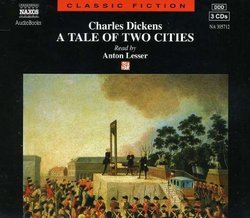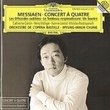| All Artists: Dickens Title: Tale of Two Cities Members Wishing: 0 Total Copies: 0 Label: Naxos Release Date: 10/9/2000 Genres: Special Interest, Classical Style: Poetry, Spoken Word & Interviews Number of Discs: 3 SwapaCD Credits: 3 UPC: 730099005722 |
Search - Dickens :: Tale of Two Cities
 | Dickens Tale of Two Cities Genres: Special Interest, Classical
|
Larger Image |
CD DetailsSimilarly Requested CDs
|
CD ReviewsA Tale of Two Cities Melvin Pena | 07/27/2001 (4 out of 5 stars) "The more Dickens I read, the more impressed I become at his skill as a writer. No matter the form, be it short, long, or a monolith like some of his best works, Dickens excels at changing his style of characterization and plot to fit whatever mode he writes in. "A Tale of Two Cities" is one of his shorter novels, and he manages to make the most of out of the allotted space. The compression of the narrative sacrifices Dickens's accustomed character development for plot and overall effect, but what we get is still phenomenal."A Tale of Two Cities" begins in 1775, with Mr. Lorry, a respectable London banker, meeting Lucie Manette in Paris, where they recover Lucie's father, a doctor, and mentally enfeebled by an unjust and prolonged imprisonment in the Bastille. This assemblage, on their journey back to England, meets Charles Darnay, an immigrant to England from France who makes frequent trips between London and Paris. Upon their return to England, Darnay finds himself on trial for spying for France and in league with American revolutionaries. His attorney, Stryver, and Stryver's obviously intelligent, if morally corrupt and debauched, assistant, Sydney Carton, manage to get Darnay exonerated of the charges against him. Darnay, a self-exiled former French aristocrat, finds himself compelled to return to France in the wake of the French Revolution, drawing all those around him into a dangerous scene.Dickens portrays the French Revolution simplistically, but powerfully, as a case of downtrodden peasants exacting a harsh revenge against an uncaring aristocratic, even feudal, system. The Defarge's, a wine merchant and his wife, represent the interests of the lower classes, clouded by hatred after generations of misuse. Darnay, affiliated by birth with the French aristocracy, is torn between sympathy for his native country in its suffering, and his desire to be free of his past."A Tale of Two Cities" is a novel driven by historical circumstance and plot, much like the works of Sir Walter Scott, wherein the characters themselves assert less agency, finding themselves forced to deal with the tide of epic events. Richard Maxwell's introduction to this newest Penguin edition does a good job outlining the themes of doubling and literary influence that Dickens works with. One specific influence I discerned in reading "A Tale" that Maxwell doesn't metion is Edmund Burke's "Reflections on the Revolution in France," which if nothing else, gives the feeling that the rampant violence of the early revolution and the later Reign of Terror has brought about an irreversible change in human nature. While Dickens remains cautiously optimistic throughout the novel that France can recover, the tone of the novel speaks to the regression of humanity into a more feral, primal state, rather than advertise any real hope for its enlightened progress. Despite the supposed dichotomy between England and France in the novel, Dickens seems to suggest throughout that there are no real differences, due to the way that human nature is consistently portrayed. With England in between two revolutions, American and French, Lucie's sensitivity early in the novel to hearing the "echoing" footsteps of unseen multitudes indicates a palpable fear that the "idyllic" or "pastoral" England he tries to portray is not exempt from the social discontent of America or France. In this light, stolid English characters like Miss Pross, Jerry Cruncher, and Jarvis Lorry appear to almost overcompensate in their loyalty to British royalty. In a novel that deals with death, religion, mental illness, I could go on and on for a week, but I won't. One of those novels whose famous first and last lines are fixed in the minds of people who've never even read it, "A Tale of Two Cities" demands to be read and admired." An Eighth Grader reviews A Tale of Two Cities Melvin Pena | 06/29/2000 (5 out of 5 stars) "This book is incredible. I read it last year (in eighth grade), and I love it. I love Charles Dickens' language and style. Whoever is reading this may have little or no respect for my opinions, thinking that I am to young to comprehend the greatness of the plot and language, and I admit that I probably do not completely appreciate this classic piece of literature. I do read above a 12th grade level, although that doesn't count for a whole lot. It took me a while to get into this book. In fact, I dreaded reading it for a long time. But nearer to the end, I was drawn in by the poignant figure of a jackal, Sydney Carton. In his story I became enthralled with this book, especially his pitiful life. After I read and cried at Carton's transformation from an ignoble jackal to the noblest of persons, I was able to look back over the parts of the book that I had not appreciated, and realize how truly awesome they are. I learned to appreciate all of the characters, from Lucy Manette to Madame Defarge. I also was affected by all of the symbolism involved with both the French Revolution, and the nature of sinful man, no matter what the time or place. My pitiful review could never do justice to this great book, please don't be discouraged by my inability." One for the ages... nto62 | Corona, CA USA | 07/07/2005 (5 out of 5 stars) "19th-century literature was less concerned with plausibility than literature of a later day. Thus, as characters are unmasked and their secret connections laid bare, the 21st-century reader may find the plot too convenient. A Tale of Two Cities is no different. Should one possess the capacity to look beyond this, however, one would find that Dickens has masterfully captured the bloodlust of the French Revolution from the both the bourgeoisie and plebeian views.
One family must face the barbarous, slaughtering revolutionary mob to save a former aristocrat. The villains are supremely villainous, the hero supremely heroic. Dickens captures the squalor of backstreet Paris, the murderous obsession of its citizens, and the utter helplessness of it's erstwhile elite. It is all tied in a bundle too convenient, but suspension of belief is no hardship given the strength of the story told. A Tale of Two Cities is at one time a history lesson and a powerful literary achievement. It is, as such, required reading and easily merits 5 stars." |

 Track Listings (12) - Disc #1
Track Listings (12) - Disc #1

